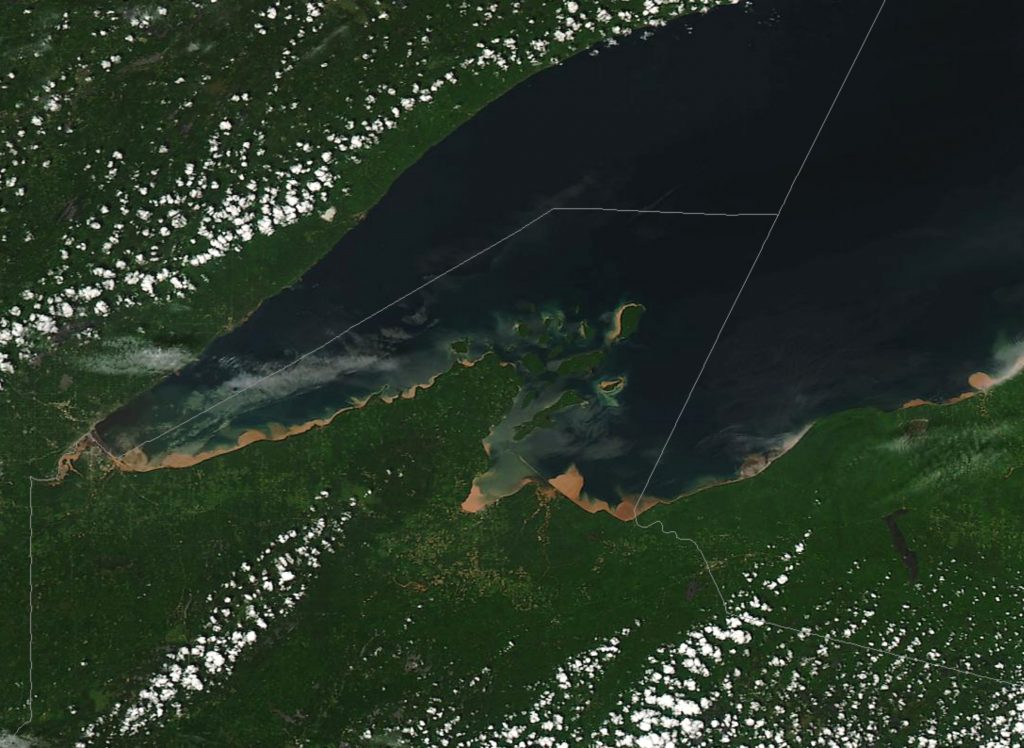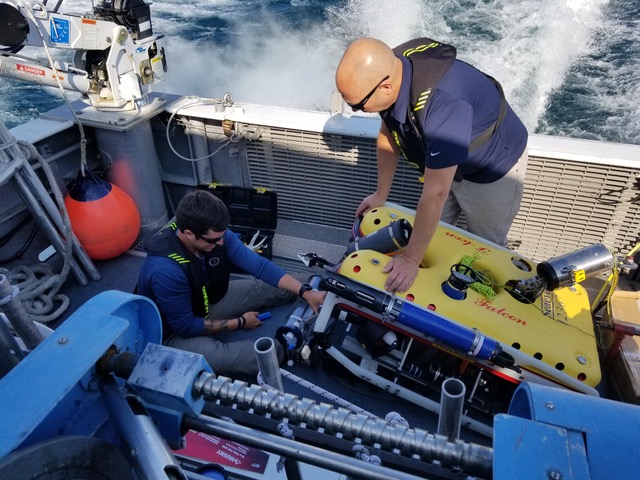Wisconsin and Great Lakes Research Would Be Hurt By Federal NOAA Cuts
Proposed 25% cut would affect institutes, labs and programs in Wisconsin.

A satellite image from June 18, 2018 shows plumes of sediment flowing into the south shore of Lake Superior following heavy rains over June 15-17. Cooperative Institute for Meteorological Satellite Studies
Climate, weather and water-related research in Wisconsin and the Great Lakes would take a hit under the Trump administration’s proposal to slash funding for the National Oceanic and Atmospheric Administration, or NOAA.
The peer-reviewed journal Science and other media outlets have reported on internal budget documents that suggest cutting more than 25 percent or $1.7 billion from the agency’s more than $6 billion budget for 2026. Funding for the agency’s Office of Oceanic and Atmospheric Research would drop 65 percent under the proposal.
Michael C. Morgan said that appears to be a plan to dissolve the office entirely. He served as assistant secretary of commerce for environmental observation and prediction at NOAA until earlier this year. Morgan, an atmospheric and oceanic sciences professor at the University of Wisconsin-Madison, said the proposed cuts are misguided.
The cuts would affect the Cooperative Institute for Meteorological Satellite Studies housed within the university’s Space Science and Engineering Center.
Morgan noted the institute at UW-Madison translates satellite data into weather observations that are used to forecast severe weather and protect people’s lives and properties, not only in Wisconsin, but nationwide. Morgan said that includes work with NOAA’s Hurricane Research Division on forecasting tropical cyclones and gauging the intensity of hurricanes.
“I think there is the danger if these cuts take place that lives could be lost,” Morgan said.
The Space Science and Engineering Center that houses the institute spent around $40 million on research in fiscal year 2024, of which more than $31 million came from federal funding. Funding from NOAA and NASA made up 65 percent of its federal funding in the last five years.

Two researchers work with a remotely operated vehicle, or ROV, for underwater mapping in the Great Lakes. Photo by Ed Bailey with Northwestern Michigan College
Cuts would affect real-time data collection on the Great Lakes
Morgan said cuts would also affect Wisconsin Sea Grant and the Great Lakes Observing System. On the Great Lakes, the Michigan-based nonprofit group provides real-time monitoring data on weather, wind, water conditions and the underwater environment. Jennifer Boehme, CEO of the Great Lakes Observing System, said roughly 95 percent of its $4.2 million budget comes from NOAA.
The group relies on more than 250 assets on the Great Lakes that include a network of buoys, weather towers, underwater autonomous vehicles and resources from dozens of partner organizations. The data provides information to help people understand safety risks from rip currents, aid fishery managers to better understand fish stocks and helps drinking water managers understand potential risks from harmful algal blooms.
One federal analysis found a $5 return on every $1 invested in the agency’s observing systems.
Boehme said the proposed budget cuts could also compromise efforts to map the Great Lakes bottom and the Great Lakes Environmental Research Lab. A NOAA spokesperson referred questions about the proposed cuts to the Department of Commerce, which did not return a request for comment Tuesday.

Christy Remucal is among researchers who found PFAS levels 50 to 70,000 times higher in foam than in the water column. Photo courtesy of Wisconsin Sea Grant
NOAA funding largest source of support at Wisconsin Sea Grant
At Wisconsin Sea Grant, the program’s director Christy Remucal said NOAA funding is the largest source of revenue for the program that’s operated for 57 years on state and federal support. Federal funding makes up 32 percent of the program’s funding, or $2.4 million. Wisconsin Sea Grant and its 30 staff support conservation of Great Lakes resources and communities through research, education and outreach.
That work includes research examining PFAS in foam on Wisconsin waterways and a Marinette manufacturer’s ties to the chemicals in groundwater flowing into Green Bay. The program also works with the commercial and recreational fishing industry, as well as the shipping industry on environmental issues. Remucal said the federal funding it receives translates into $84 million in local economic benefits.
Proposed cuts would also eliminate funding for the National Estuarine Research Reserve System, or NERR, and coastal management grants. Superior is home to the Lake Superior NERR and one of only two research reserves on the Great Lakes. The reserve’s director Deanna Erickson said around 70 percent of its funding comes from NOAA, or nearly $881,000 in the last fiscal year.
“We track algae blooms, we have buoys and water quality stations up and down the St. Louis River. We track changes in water health,” Erickson said. “All of those things can impact tourism, fishing [and] drinking water.”
The cuts also pose concerns for designation of a reserve site in Green Bay, as well as grants issued by the Wisconsin Coastal Management Program. While cuts are proposed for 2026, concerns remain over whether NOAA may provide sufficient funding to cover the cost of already selected projects in Wisconsin. The continuing resolution passed by Congress didn’t provide guidance on how agencies should spend those funds.
Wisconsin Democratic U.S. Sen. Tammy Baldwin said in a statement that President Donald Trump is trying to remove a vital resource that communities, businesses and farmers rely on for accurate weather forecasting.
“Gutting these critical services for Wisconsinites will make us less prepared to face extreme weather events like flooding and drought across the state, hurt our economy, and threaten Wisconsinites’ way of life,” Baldwin said.
Wisconsin and Great Lakes research could suffer under proposed cuts to NOAA was originally published by Wisconsin Public Radio.
If you think stories like this are important, become a member of Urban Milwaukee and help support real, independent journalism. Plus you get some cool added benefits.





















